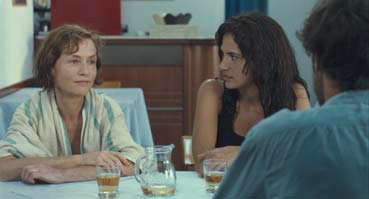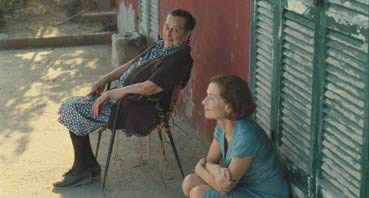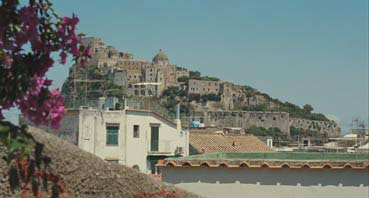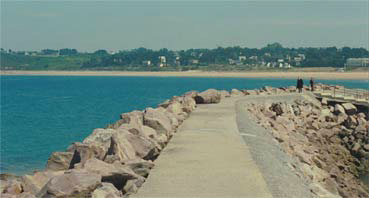|
The title, Villa Amalia, its poster, promotional stills and the film's basic concept of a woman starting a new life on an idyllic Italian island after catching her husband playing away from home, suggests everything the film isn't. Villa Amalia is not a sunny rom-com jaunt through Italy in the mould of the likes of Under the Tuscan Sun, nor is it continuing the trend this year, of women struggling to flee their gilded cages and shaking lose the shackles of family, depicted in both Leaving and I Am Love. While I am routinely attracted and drawn to both of these kinds of films, the kind I dread under the general heading of 'women's pictures' (far more appropriate terminology than 'chick flicks' which reduces the films by their sex rather than the issues discussed) are those of the Shirley Valentine variety, albeit with more money in the wallet, and which thankfully, Villa Amalia is the very antithesis of. I'm speaking of the pretentious and interminable quests of privileged people finding themselves in picturesque locales, the latest example of which is currently showing at multiplexes across the land in the form of Eat Pray Love. In that film, a woman with a complete lack of self awareness and nothing to moan about spends a two-hour-plus running time moaning and – when they can get a word in edgeways – being told by those she encounters, all of her character deficiencies which are perfectly obvious to the audience even before she's made it out of Manhattan, but utterly unfathomable to her. All of this is spouted off in the pseudo-spiritualism and faux-wisdom of Chinese fortune cookie self-help books. She could've saved a lot of time and money if she'd just paid a visit to the local Waterstones.

When you switch out Julia Roberts for Isabelle Huppert, unsurprisingly the same would-be stock caricature becomes unreadably complex and enigmatic. Huppert who has always pitched herself on a finely-tuned almost imperceptibly adjustable wavelength of opaquacity, takes the cue of her character's name Ann Hidden to extremes, rendering what is perhaps her most unknowable, poker-faced performance yet, a sharp reminder of why she is so celebrated as an actress and why adjectives like legendary often precede her name. It only takes seconds to think on, but has there ever been an actress like Huppert, who at once gives you so much and so little regarding her character's motivations, yet with so much to unpack in the minutia of every choice she makes second to second in a scene, is still able to leave open such a wide berth of interpretation?
"Where do you get that face? It comes from another world", Ann's soon-to-be lover, Giula remarks not long after saving her life from an almost terminal ocean dip à la Kate Chopin. Huppert's face is indeed so otherworldly and magnetic that the films, which feature it rarely, focus on anything else, almost seeming to blur everything in the frame around her countenance. A face so affronted and repressed it gives you all the back-story without needing to illuminate it in any way. This is why you watch anything staring Huppert, principally for her singular ability to literally express the psychological physically. While I wasn't surprised at the insistence of Huppert's face in a range of close-ups, I'll admit that I was disappointed by the lack of 'scenery' given that the film takes place on the 'green island' of Ischia, a place in which I've spent much of the last seven years (including my recent reports from the island's annual film festival for the site) and where my parents subsequently moved and made their home. If you want a window into the old world charm of this unspoiled marvel and the lifestyles of yesteryear which still very much pertain, you'd do better to seek out The Talented Mr Ripley, the film which prompted my family's first visit there and I suppose, changed our lives forever.
Director Benoit Jacquot comes clean in the interview on the disc, that is film is biased towards Huppert because she is in every scene and as the spine of the film, he was attempting to capture every movement of her body and soul and not focus on what is going on around her. That's not to say that the film is bereft of scenic beauty, as you'd automatically find that pointing the camera in any given direction on the island, but it is far from the focus. Huppert as the alien from another world, only seems interested in shutting herself out from ours by holing up in the titular Villa, a decision as mystifying as it is sudden.

Ann's clean break from her former life as a concert pianist is alarmingly abrupt though refreshingly, it only serves to reinforce the fact that for once, the husband's infidelity is the catalyst and not the reason for her life going into an unexpected tailspin. Ann is a real feminist, albeit an alien one. One suspects that as the 'alien' Ann never really related to her husband, long before (and probably why) he started cheating on her. When she is caught spying on her husband by old friend, George, their interactions confirm Ann as a woman who's struggled all her life with a severe case of anthrophobia that may or may not be rooted in her father's neglect and her brother's death. So awkward is she around other human beings that George practically has to beg Ann to have dinner with him after not having seen or heard from her for many years. Despite the time that has passed, George clearly still pines for Ann rather pathetically and when he seats himself on her side of the table rather than opposite, just so he can be that little bit closer, the impression is not of the one time, would-be lover who missed his chance, but the tragic romantic who never stood any chance whatsoever. When George later visits her in Ischia and is crushed to find she now has a female lover, he reacts by hitting the town and hitting on men, as if to say "If I can't have her, I can't have any woman, so it'll have to be men from now on."
If Ann is in love with anyone or anything, it's music, which allows her to be intimate and emotional in a way that human interaction doesn't. After catching her husband out, all she has left is her music, but with only that to stand on, like a house of cards, it too topples, losing its meaning. In her last musical performance that Ann herself cuts short when she storms off stage in a fit of existential anxiety, the tinkling of keys reads as the ticking of clocks, and with time running out, the realization that she must live her own life and not the career of musical prodigy she inherited from her brother after his death. Even her own life isn't really her own and two thirds of the film devotes its time to Ann crossing the i's and dotting the t's of what she's jettisoning in order to disappear completely as if she were a ghost and reinvent herself in a foreign country. Ghosts are something, which pervade this film to the extent that I'd argue it's in fact a lot less about reinvention than it is about outrunning the past. When the two long lost friends fill each other in on the missing years by candlelight, the flames flicker over them like ghosts of who they were and who they were never going to be. When Ann takes up residence in the Villa we discover that it too is haunted, as she is, by death, and even in another country the ghosts of her past emerge unexpectedly on her doorstep. The film score by Bruno Coulais rather overstates this ghostly aspect, striking the register of horror chiller not in accord with the film, and misinterpreting a woman running from her past as a Hollywood thriller.

In the same way that the music subverts expectation the title does the same, for life in the Villa is not the journey but the destination. As Ann systematically and methodically closes every door on who it is she used to be before heading off to Italy, what comes across is her immovable resolve to start again with a clean slate rather than what she'll do with it. When closing her bank accounts and withdrawing large, suspect sums of money, she steamrolls over the bank's protests, refusing to be denied. This one scene tells us very succinctly how impossible it is for a person to take on a new identity in the age of big brother, yet Ann chooses to bulldoze these walls down instead of clambering over them. Her choice of Ischia as the place of self-imposed exile is seemingly very haphazard, but you also get a sense of just how much she's thought through the idea of a fresh start, when she confesses that'd she'd never consider flying anywhere in the US because they take passenger lists in Washington. Why so much time is spent on Ann selling her house and car, shutting off the phones, burning photographs of her and her partner and all the CDs and records that constitute evidence of her past as a concert pianist can frustrate in the way that normally, this is all the stuff you'd have dealt with by the end of the first act, but such emphasis and repetition is key to our understanding of a woman trying out mantras, in effect: "I will make this new life a success. I can become somebody else." When you repeat something over and over again, does it become clearer, or does it lull you out? Depending on how many times you say it, the meaning begins to morph and that elusive change of intention is what's important here, rather than pinning down a concrete meaning on a mental state which we're none the wiser of by the film's end. This is a journey not so much about self-discovery as much as it is a hypnotic, incremental build to ellipsis of self.
A decent rather than exceptional transfer whose contrast shines when the light is right but can soften on black levels in darker scenes. There's a colour-drained greyness to the earlier scenes, achieved more through set dressing and costume design than post-production filtration, that eases once Ann arrives in Italy, which was doubtless a dliberate move on director Benoit Jacquot's part. There are some visible artefacts on some areas of single colour, but the image is generally sharp with a pleasing level of detail and is free of dust or damage.

The choice between Dolby 2.0 stereo and 5.1 surround tracks will be down largely to personal preferance. This is never a show-off mix, and both handle dialogue and background sound well, with the rears on the 5.1 largely confined to location atmospherics and the odd sound effect.
Interview with Director (11.52)
Benoit Jacquot is forthcoming about his adoration for Isabelle Huppert, especially how in their fifth feature together she is the backbone of the film, featuring in every scene. Of their periodic collaborations he touches on their joint working process before giving an unsatisfactory explanation of the music featured in the film, ignoring the bafflingly bold choices of Bruno Coulais' original score and focusing instead on the adaptation of classical pieces and how they relate to the character of Ann and her perspective of her own life. The inevitable dash of French pretension rears its head when he talks about the elemental importance of water in the film and how Ann, representing fire is trying to achieve a liquid state. Make of that what you will. I'd have much rather him talked about his choice of Ischia as a location, on which he offers nothing. The short, dry interview is rounded out by the film's trailer.
Picture Gallery (01.02)
A scored collection of behind the scenes stills.
Trailers
A whole host of trailers for other films put out by Peccadillo Pictures including the films of Lucia Puenzo, XXY (highly recommended) and The Fish Child (the definition of sophomore slump).
This one woman show is yet another in a string of hits for Huppert following the likes of The Sea Wall, Home and White Material. Fans of the actress will flock to it and no doubt love it, but those hoping for escapist exoticism, won't find it in a film that transports you mentally rather than geographically.
|